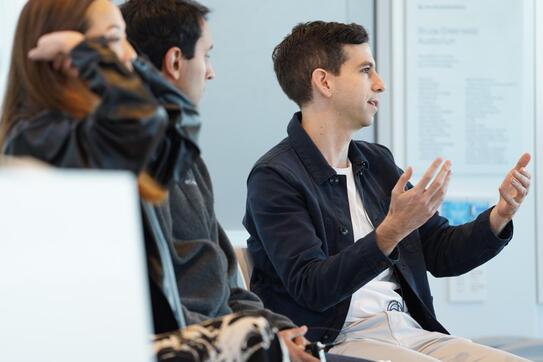One of the reasons Tori Bell ’23 decided to get her MBA at Columbia Business School is “the fact that Columbia allows you to be immersed in the founder community in New York City,” she says. According to Bell, not only do students gain exposure to the city’s resources and venture capital, but at CBS, they find a “plethora” of courses and opportunities to support students who are interested in launching new ventures.
“The number of courses in this topic area has grown at a remarkable rate, expanding by more than 40 percent over the past five years, and enrollment has grown even faster,” says Paul Tetlock, Senior Vice Dean for Curriculum and Programs.
The range of subjects offered is vast, with courses including Virtual Reality & Artificial Intelligence, PropTech and Real Estate Disruption, Entrepreneurial Strategy, and Entrepreneurial Law for Startups. In all, the School’s entrepreneurship and innovation curriculum strives to provide specific knowledge and hands-on experience for students hoping to disrupt industries and change the world or, at the very least, make it better. This means they need to know how to ideate, strategize, market, and grow businesses, as well as invest and raise money. They also need to learn how to leverage emerging technologies like artificial intelligence that are trans- forming each of these areas.
Not surprisingly, many of the most popular CBS courses not only help students build entrepreneurial skills but also cultivate a venture mindset that’s applicable in any setting.
From startup strategy to VC fundamentals, the School’s courses have become a staple of the CBS environment, says Jorge Guzman, the Gantcher Associate Professor of Business at CBS. The curriculum “has gone from just being about new businesses to learning lifelong skills that are useful to a lot of students—and has led to a lot of new companies coming out of CBS.”
The following courses are examples of the burgeoning entrepreneurship and innovation curriculum at CBS.
Nurturing Innovation
Foundations of Innovation, taught by Melanie Brucks, assistant professor of business, focuses on bringing to market elegant and efficient solutions to meet strong customer needs. “This challenge is relevant whether you work for a startup or a large company, or whether you sell products or services."
The course introduces methodologies, strategies, and tools such as design thinking and iterative prototyping, structured around the basic steps of the innovation process. While Brucks’s course is titled Foundations of Innovation, it could also be called Foundations for Business.
New technology often provides the spark for entrepreneurial opportunities, so Dan Wang, the Lambert Family Associate Professor of Business and faculty co-director of the Tamer Center for Social Enterprise, teaches the popular Technology Strategy class, which prepares students to exploit technological gains.
The course investigates key strategic questions, such as how to respond to disruptive innovations, how to commercialize and protect new innovations, and how new technologies change the way we interact. It also explores how technology and innovation shape how firms can leverage network effects to gain competitive advantage, and how scaling new technologies can both address and create social problems.
Skills for a New Economy
Professor Guzman teaches Entrepreneurial Strategy, a course geared toward the art of identifying a competitive advantage when a company is too new to have one or when it is entering a new market. Using case studies and examples from different industries and sectors, the course helps students learn to pinpoint a sustainable competitive advantage in the uncertain early stages of a startup.
“Shared learning is central to the process,” Guzman says. “To the extent that students want to connect, talk about their own companies and venture ideas, and talk about what they’re doing, I am delighted to do that.”
He says his class is ideal for students aspiring to thrive in the new economy, whether they aim to become management consultants, entrepreneurs, or investors, or nurture new ideas within established companies.
“We’re getting a lot of finance students now because a significant portion of finance jobs are in either venture capital or private equity, which fundamentally requires looking at startups and understanding the value of the idea,” Guzman says.
“There’s a third group of students who are more flexible,” he adds: Whereas the MBA degree program used to be about finding a job, today a lot of students come to CBS thinking about their options and are open to entrepreneurship as an alternative career choice.
Entrepreneurship from Another Angle
Students can also learn entrepreneurship from the perspective of the venture capitalist in Professor Angela Lee’s Foundations of VC class, which demonstrates the process of investing in early-stage startups.
“The course is very experiential,” says Lee, professor of professional practice and faculty director of the School’s Eugene M. Lang Entrepreneurship Center. “Learnings are applied to companies that are currently raising capital; students assess each company as if they were considering investing.”
Guest lecturers provide varied perspectives, and real startup pitches from aspiring entrepreneurs immerse students in the venture decision-making process.
It’s the kind of practical learning that underscores the School’s commitment to entrepreneurship and innovation education, which has not only attracted driven students like Tori Bell but has also seen substantial growth in course offerings and enrollment over the past several years.
